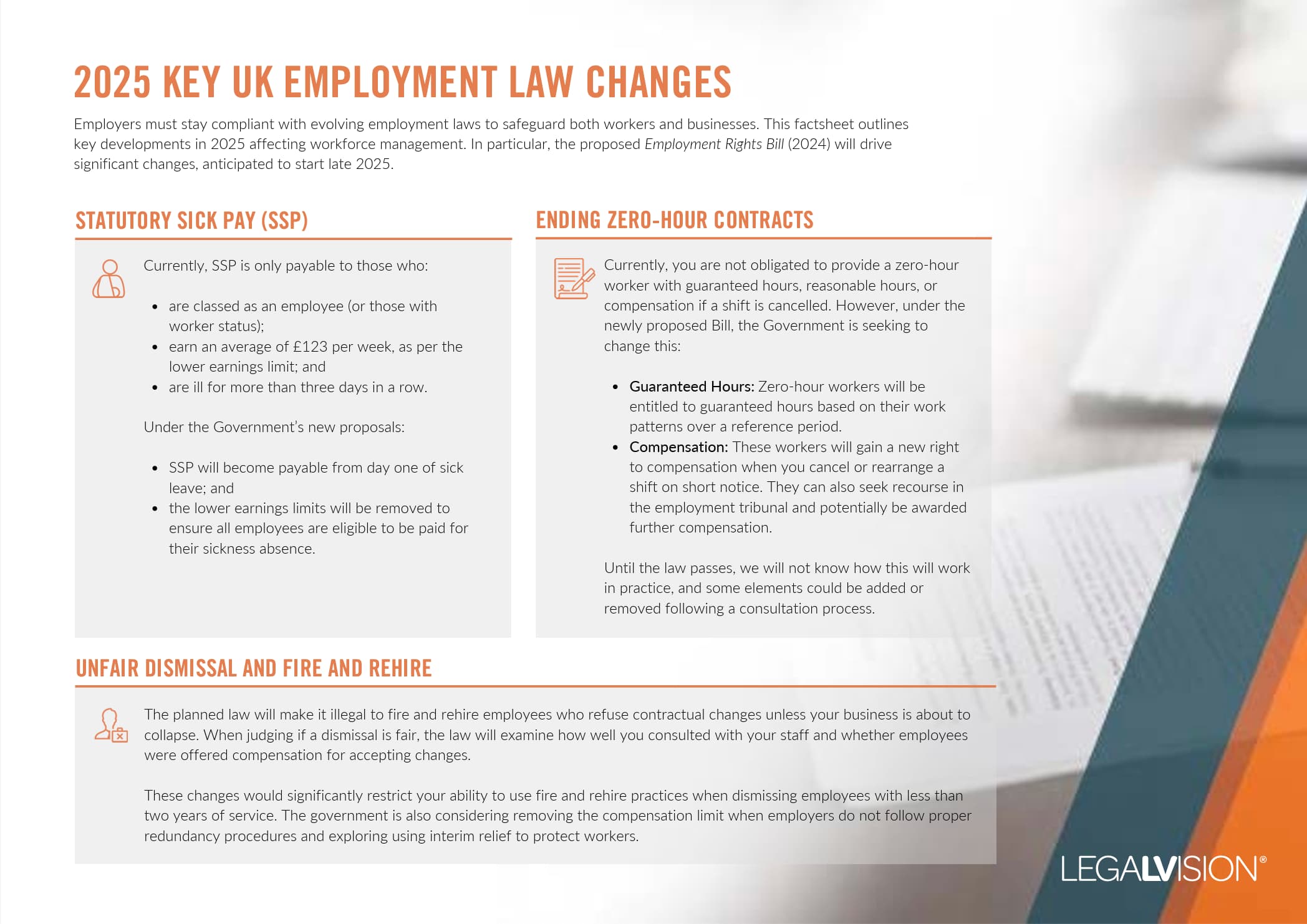In Short
- Employers must take proactive steps to prevent sexual harassment in the workplace.
- New laws require employers to fulfil their duty to prevent harassment by third parties.
- Employees can report sexual harassment up to six months after leaving their job.
Tips for Businesses
Ensure your workplace policies are up to date and include clear processes for preventing sexual harassment. Train all staff on appropriate workplace behaviour and establish channels for reporting harassment. Regularly review and update your policies to remain compliant with the latest legal obligations.
Sexual harassment in the workplace is a prevalent issue that, as an employer, you cannot afford to ignore. You have a duty to provide a safe and respectful work environment for all the staff at your business. Despite sexual harassment being a form of unlawful discrimination under the Equality Act, the recent passing of The Worker Protection Bill (Amendment of Equality Act 2010) 2023 will strengthen and require increased obligations for employers to prevent and respond to sexual harassment complaints. This article will highlight the practical steps that you should take when considering the changes that come into force in October 2024.
What Is Sexual Harassment?
Sexual harassment is any unwanted physical, verbal or non-verbal conduct of a sexual nature that violates someone’s dignity or creates an environment that is:
- intimidating;
- hostile;
- degrading;
- humiliating; or
- offensive.
Some examples of things that could be considered sexual harassment include:
- making inappropriate sexual comments or jokes;
- unwanted physical contact like touching, hugging or kissing;
- staring or making offensive gestures of a sexual nature;
- asking inappropriate questions about someone’s sex life; and
- displaying pornographic or sexually offensive material.
What Is the Current Legal Position?
Deriving from the Equality Act 2010, sexual harassment is against the law and is considered a form of unlawful discrimination. As an employer, you are responsible for ensuring your staff members do not engage in any form of sexual harassment. This responsibility extends beyond just the physical workplace. You can be held liable if sexual harassment from one of your employees occurs in work-related settings and situations outside the office environment.
This includes instances such as:
- company social events and gatherings;
- business trips and off-site meetings; and
- communications on social media relating to work.
Call 0808 196 8584 for urgent assistance.
Otherwise, complete this form, and we will contact you within one business day.
What Changes Are Due to Come Into Force?
The existing obligations will be extended from October 2024. These updated obligations will require employers to take ‘reasonable steps’ to prevent sexual harassment in the workplace.
This means that you will now need to demonstrate that you are proactively taking preventative steps to prevent sexual harassment from occurring in the workplace.
Should an incident occur and if a matter progresses to an employment tribunal where it is found that you did not take proactive reasonable steps, the tribunal may impose an additional 25% uplift on any compensatory award to reflect this failure.
What Steps Can You Take to Ensure That You Are Remaining Compliant With the Law?
With the additional obligations due to come into effect in the latter half of the year, you will need to demonstrate the ‘reasonable steps’ that you have taken to prevent sexual harassment in the workplace. Some examples of ‘reasonable steps’ are outlined below.
Registers
You should ensure that your business has a reporting register that highlights incidents, the actions taken, and the next steps. This is an efficient way of monitoring a situation and also reviewing your company’s approach when it occurs.
Sexual Harassment Policy
Another proactive step that you can take is to implement a sexual harassment policy and distribute this to your workforce. Not only does this outline the company’s stance, but it also provides employees with an awareness of how to report incidents and the processes that will be taken when such incidents occur. This could be pivotal in encouraging people to come forward and feel confident when discussing a concern with a company.
Risk Assessments and Training
By providing training and conducting risk assessments for events outside of work, you can demonstrate:
- the reasonable steps you are taking; and
- that there is a company-wide effort to foster a safe working environment.
Reporting Channels and Processes
Arguably, the most important step that you can take is ensuring that in the event that an incident of sexual harassment occurs, individuals have a clear reporting channel. This reporting channel can allow individuals to be open, vulnerable and honest about what has happened while also knowing that there is a thorough procedure in place to investigate the situation and remedy it.

This factsheet outlines key developments in 2025 affecting workforce management.
Key Takeaways
As an employer, it is important that you are aware of your new obligations towards your staff. The Worker Protection Bill (Amendment of Equality Act 2010) 2023 will strengthen employer obligations to prevent and respond to sexual harassment from October 2024 by implementing new ‘preventative duties’. These will not only include preventing sexual harassment from occurring in your workplace but also taking and demonstrating reasonable steps. In either case, a failure to do so could result in the Equality and Human Rights Commission investigating and enforcing your obligations.
You can create a healthy and safe workplace culture by:
- implementing preventative mechanisms;
- creating and advising your employees of transparent reporting channels;
- handling complaints sensitively and fairly;
- staying up to date with legislative changes; and
- adequately training your staff.
If you have questions regarding your obligations, our experienced employment lawyers can assist as part of our LegalVision membership. For a low monthly fee, you will have unlimited access to lawyers to answer your questions and draft and review your documents. Call us today on 0808 196 8584 or visit our membership page.
Frequently Asked Questions
Handling complaints of sexual harassment with sensitivity and fairness is crucial to maintaining a respectful workplace. As an employer, you should ensure that you have a confidentiality policy that you follow whenever you conduct an investigation.
The employment tribunal may impose penalties against you. Additionally, you may be held vicariously liable if the harassment occurs in a work-related setting.
We appreciate your feedback – your submission has been successfully received.












